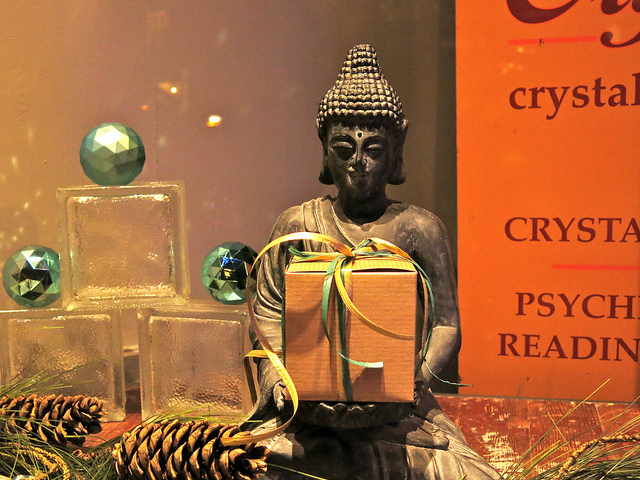
Heartfelt and unconditional generosity comes very natural to some people. This is known in Buddhism as dana.
Dana is the first of the Six Paramitas or Perfections: generosity, discipline, patience, joyful effort, meditation and wisdom.
However, sometimes it can be difficult to give with true and sincere intentions as we grow attachments to material belongings, financial wealth or personal belongings.
Voluntarily and generously giving energy, material goods or wisdom is a universally recognized practice, as well as one of Buddhism’s most important virtues.
The Buddha taught that when we grasp on to things and form attachments we are causing ourselves deep rooted unhappiness and discontent.
Buddhism teaches to practice giving with an open hand, so that we can allow whatever we are offering to be taken freely, rather than a closed, possessive, tight fist, as though we want to keep hold of our gift, or even take it back.
When we give without attachment to the outcome we are able to separate ourselves from whatever it is we are giving.
If we attach to something, or someone, we are viewing ourselves as separate to everyone and everything else in the universe. We see ourselves as a separate entity rather than seeing there is no giving without receiving, no receiving without giving. So essentially giving is one act, with two sides to it, a giver and a receiver, which shows “oneness.”
Through the act of giving, we can learn to remove our attachment to possessions. Giving helps us to let go of control, possessiveness, greed and selfishness.
“Letting go gives us freedom, and freedom is the only condition for happiness. If, in our heart, we still cling to anything—anger, anxiety, or possessions—we cannot be free.” ~ Thích Nhất Hạnh
When we give with the expectation that we will receive, even if the receipt is gratitude, we are placing expectations on whatever it is we are giving. These expectations can then lead to suffering as we may feel our generosity was unappreciated, unwanted, unwelcome or altogether not enough. We may easily become resentful, frustrated and even angry if we feel that our actions have been ungratefully met.
It has become somewhat commonplace in many dynamics for gifting to be an exchange, rather than a singular, selfless act. Even if all we expect is a few words of thanks, we are still expecting a return. It is almost as though our gift is an investment. When we deposit and hope that our generosity is welcomed, recognized, valued or appreciated, ultimately we are looking for a return.
There could be a variety of motives for our gifting, we may do it to feel good about ourselves, we might want to look generous, we may feel pressure as other people are giving to us, we may be expecting appreciation and gratitude or we may be hoping for a gift in return. However, this form of giving is not genuine or sincere. The essence of gifting is that the gift is given freely, not because we have been coerced or manipulated into giving.
If we look at the process at different stages, we can see our intentions and how we felt at each part. When we are preparing or looking for the gift we should be thinking about the person and about what would be of benefit in their life and we should not see it as a drain on our time or finances. We should feel relaxed, happy and open-hearted throughout the offering—before, during and after.
When practicing generosity, Buddhism teaches not to place financial value on the gift, but rather, give something with meaning. It is far better to give or receive a gift that is useful, personal or that has been thought about, than it is to receive one just because it cost a lot of money. We should spend time considering what the person we are giving to would like to receive, to ensure that the gift we choose is appropriate and that we are not giving just for the sake of giving.
Unfortunately, we can all too often feel that if we keep on giving, without receiving anything in return, we have somehow lost out. This is why Buddhism teaches us to drop all attachments. Not just to giving, but to everything.
Whenever we see ourselves as “giving” or “generous” or anything else, we are placing attachments to our self image. All attachments have a degree of suffering attached to them. Whenever we label ourselves as something, we automatically apply definitions and expectations to those labels. The Buddhist belief is that we not only have to drop the attachment to receiving, we also have to drop the belief that we are “giving.”
When we can drop overall attachments we will find freedom, peace and also find that we may even enjoy giving far more than we enjoy receiving.
We are already receiving infinitely.
We receive from nature, from our physical bodies, from the world and beyond, regardless of whether we show gratitude or give something back in return. We have water, air, our senses, food, shelter and everything we need to survive and more. We are receiving every moment, without realising that something or someone, has provided and given us all that we need. And quite often, without saying thank you for anything.
We receive in abundance. So, we can also give in abundance.
With good intention and without expectation.
“Generosity brings happiness at every stage of its expression. We experience joy in forming the intention to be generous. We experience joy in the actual act of giving something. And we experience joy in remembering the fact that we have given.” ~ Guatama Buddha
Relevant Favorite:
“Generosity is the Virtue that Produces Peace.”
~
Author: Alex Myles
Editor: Travis May
Photo: Flickr/Torbakhopper






Read 1 comment and reply